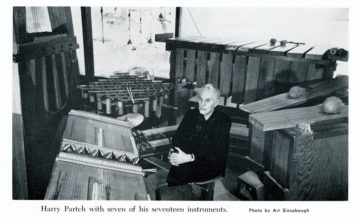David A. Taylor at The American Scholar:
 In winter 1940, beside a highway in the California desert, a reedy man bends down for a closer look at the road’s guardrail, where someone has scribbled graffiti: It’s January twenty-six. I’m freezing. Going home. I’m hungry and broke. I wish I was dead. But today I am a man … The onlooker feels a pang of recognition. He can hear these words in his head—the beginnings of another song.
In winter 1940, beside a highway in the California desert, a reedy man bends down for a closer look at the road’s guardrail, where someone has scribbled graffiti: It’s January twenty-six. I’m freezing. Going home. I’m hungry and broke. I wish I was dead. But today I am a man … The onlooker feels a pang of recognition. He can hear these words in his head—the beginnings of another song.
That onlooker was Harry Partch, a musician and writer who balked at the strictures of Western music to become one of the most influential avant-garde composers of the 20th century. Few people today have ever heard of him—Partch seemed to position himself very far from folk hero, and he rarely gets mentioned in the same breath as his contemporaries Woody Guthrie or Huddy Ledbetter, better known as Leadbelly, who drew on deep folk traditions for their music. By contrast, Partch has long had the reputation of an iconoclast and a wanderer. His compositions are written for instruments he built and in complex scales of his own devising, thrumming like wild, futurist gamelan performances.
more here.
